September 23, 2020—During a normal fall day at Harvard T.H. Chan School of Public Health, the Kresge building would be alive with energy as students, faculty, and staff moved between classes and meetings and filled the cafeteria and other common spaces with greetings and chatter. Custodial Supervisor Raul Andino loved being around that buzz of activity, and after nine years at the Chan School (and 20 years overall at Harvard), he always saw friends and familiar faces while making his rounds. Now, six months after the School shut down most of its operations in response to the COVID-19 pandemic, his work days are much quieter. While most community members started the semester remotely, Andino comes to campus every day to lead the team of custodians who are working to keep the School safe for researchers and other essential personnel.
“Sometimes, I look at the pictures of students in the cafeteria and wonder where everybody went,” he said. “Never in my wildest dreams could I have imagined something like this happening.”
Andino is proud of how quickly the School’s 20 custodians adapted to the new normal of eight-hour shifts in masks, solo lunch breaks, and enhanced cleaning procedures. To further minimize their exposure to the virus, they have been divided into two morning and two evening teams, with each team coming to work on alternating weeks. Much of their days are spent on treks around the School’s hallways hitting high-touch areas like elevator buttons and door knobs with an electrostatic sprayer—a gun attached to a backpack that quickly releases a fine mist of safe and environmentally friendly disinfectant. [See below for a video of custodian Felix Arevalo using the sprayer]
Like Andino, most of these workers commute on public transportation each day. It can be stressful, Andino said, especially when trains are crowded and people don’t wear masks. “But from the beginning, my team never hesitated to say that they would come into work,” he said. “To me, they are heroes.”
‘No instruction manual’
When it became clear in early March that the School would need to shut down for all but a few lab workers and other essential personnel, leaders from around the School—in consultation with colleagues across the University—met to develop plans that would be flexible enough to adapt to changing Massachusetts and federal guidelines as the pandemic evolved. [See Closing, reopening labs was a complex experiment]
“There was no instruction manual for something like this,” said Senior Director of Operations Alex Machaiek. “The main concern, obviously, was keeping the campus safe, so we looked at the tools we had to increase cleaning and control access to our buildings.” The School underwent a deep cleaning early in the shutdown, and Operations also overhauled the air handling units. New filters were installed at a safety standard two levels beyond what was called for in state and federal guidelines.
Since March, all 13 members of the Operations team have met daily over Zoom to go over ideas and assign work, with four coming to campus on rotating shifts to oversee the physical plant. Despite occasional logistical hurdles, they’ve kept up with a wide variety of tasks, including keeping the mailroom running, training security guards on new building access guidelines, overseeing accelerated renovation of the student apartments at Shattuck International House, procuring hard-to-find PPE and cleaning supplies, and making sure the alarm systems stay in good working order.
“Everybody on our team has been willing to step up and take on roles beyond their normal area of responsibility,” Machaiek said. “They’ve done a great job doing whatever needs to be done to keep the School running.”
For Machaiek, one silver lining from the intensive amount of planning meetings required to close the School and then gradually begin to re-open to lab researchers over the summer has been that the Operations team has developed a greater understanding of the research community’s needs. He and Danny Beaudoin, director of planning and facilities, both serve on the COVID-19 Oversight Team, co-led by Delia Wolf Christiani, associate dean for regulatory affairs & research compliance, and Noman Siddiqi, senior lab director in the Department of Immunology and Infectious Diseases. The team reviews labs’ plans for re-opening and bringing back workers, and also works with safety officers in each lab to ensure that everyone stays in compliance with guidelines.
“It’s been encouraging to see that the research community is eager to learn and mindful of following procedures,” Christiani said. If someone submits a complaint through an online portal on the Office for Regulatory Affairs & Research Compliance site—about someone not wearing a facemask, for example—“we work with Operations to have corrective actions taken right away. That makes people feel well-supported,” she said.
Beaudoin said that he’s proud to see the School’s public health mission reflected in its response to COVID-19—both in faculty members’ research and media outreach and in its efforts to protect its own community. In addition to Andino, Beaudoin highlighted the hard work of other team leaders over the past few months: Ben Valente, who oversees the trades group, and T.J. Moon, who oversees security.
Andino wants those working or studying at home to know that the School is safe. “We keep an eye on everybody,” he said. “We have to take care of each other.”
Photo: Courtesy of Danny Beaudoin
Video: Courtesy of Raul Andino
